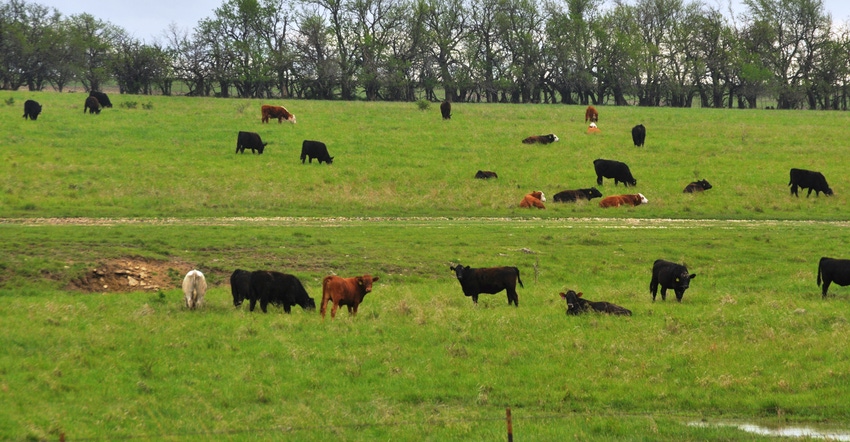April 7, 2017

By Rhonda McCurry
When it rains, it pours. Lately, it's been raining, and that means that ranchers will soon be dealing with flies and parasites.
I can already envision the hordes of pests that bother livestock from kids' 4-H projects to mature cows. I can imagine the fly spots and feel the personal irritation.
We’ve used everything from insecticide rubs to fly tags and daily sprays. The most fun I’ve had is a pellet product that is scattered on surfaces. It attracts flies, and after they ingest it, they get dizzy and die. The day after I put this product on the concrete floors of our 4-H barn, we sweep up dead flies.
The problem is that new flies always arrive.
Since the kids have pigs and goats during the summer months, we use a monthly wormer product in addition to fly control. It’s a necessary expense to give these animals a wormer medicine every 30 days to prevent the internal parasites that cause them to quit eating or even die.
A swine veterinarian once told me that 70% of all pig livers are thrown out at packing plants across the country because they have been demolished by roundworms. It means most swine owners don’t worm pigs regularly enough. Once the infected pigs are close to market weight, it probably seems pointless to a producer to give the extra dose of dewormer. The result is an animal that's not in good shape on the inside.
Mark Alley, technical service veterinarian with Zoetis, says the best thing ranchers can do is spend time consulting with their local veterinarian on parasite control no matter whether it has been a wet or dry year. Ranchers may not realize how much of an effect curbing fly and pest problems can have on the financial side as well as the overall health in an operation.
Basically, in a wet year the spring pastures are abundant with moisture and may have standing water. Alley says anytime there is standing water and mud, the impact on animals can be significant. Those wet pastures make animals more prone to foot rot, parasite problems and other disease situations.
Parasites survive cold
Producers can't count on a cold winter for protection.
“It rarely ever gets cold enough to kill internal parasites,” Alley says. “Probably the biggest environmental impact on larvae for most nematodes is actually when it becomes really dry. That has a bigger impact on killing larvae than anything else.”
Even cows in northern-tier states do not see temperatures cold enough to actually impact parasite growth. Depending on the species of parasite, Alley says some infected larva can live for 20 months. In Canada, he adds, many researchers have discontinued research on the cold-kills-parasites theory because temperatures are not frigid enough to truly impact parasites.
When July and August hit, the fly and parasite situation gets much worse. Some eggs of parasite species are able to live for a long time in hot, dry weather and extreme drought. Alley says this is when ranchers see the most problems. To stave off a parasite epidemic in the herd, ranchers must work with their vet to make smart decisions.
Immune response can be inhibited
Internal parasites can have a negative impact on production as well as immune responses. Parasites can suppress immunity to the point where cattle do not respond to vaccines and, thus, are not protected from disease.
“Insecticide dewormers are not as effective as we would like them to be,” Alley says. “Parasites like cooperia and nematodirus don’t do quite as well with products like Dectomax or other insecticides. You may have to use white dewormers like Safeguard to do a better job of controlling those parasites.”
Ray Kaplan, University of Georgia College of Veterinary Medicine, says managing “refugia” is a relatively new approach to tackling a parasite issue. Many producers may not understand it or be aware of its benefits. Refugia is the concept of leaving some internal parasites unexposed to a dewormer, essentially giving them refuge, and reducing the drug-resistance selection pressure caused by the dewormer. It can help slow down the development of resistance.
Slowing down resistance development
Successful implementation of refugia may include:
• not deworming all cattle when there are few parasite larvae on the pasture (In the South, this would be during the hottest part of the year, and in the North, during the coldest part of the year.)
• only deworming incoming cattle and leaving resident cattle untreated during extensive dry periods, when infection is low
• not using the same class of dewormer on resident cattle repeatedly
• not using a dewormer and then moving immediately to a clean pasture, as this will contaminate the new pasture with only resistant parasites
• not deworming at least 10% of the animals, known as “selective non-treatment”
We all know flies and parasites are going to happen. It’s my least favorite part of caring for livestock, but with some professional consultation, extra effort to treat and deworm animals, and working toward refugia, we just might stand a chance of keeping those pesky pests at bay.
McCurry writes from Colwich.
You May Also Like




